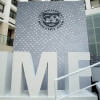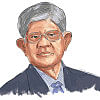IMF getting BB ready for post-LDC world
Bangladesh's preparation for LDC graduation would start in earnest with the International Monetary Fund's 42-month loan programme, where one of the objectives is to overhaul the monetary and exchange rate policies to meet the needs of an open economy.
"The current eclectic monetary policy regime may not be effective in meeting the challenges of a more diversified and open economy after the LDC graduation," said the IMF in its staff report for the $4.7 billion loan programme.
The existing monetary policy framework has a "multitude of policy instruments" -- such as targets for credit growth, broad and reserve money -- that aim for "opaque objectives" and emit "weak communication" about the Bangladesh Bank's strategy.
This limits the central bank's standard objectives: low and stable inflation and helping manage economic fluctuations.
Subsequently, the Washington-based multilateral lender prescribed an interest rate corridor system and a floating exchange rate as the first steps towards modernising the monetary and exchange rate policies.
To put it simply, the much-maligned interest rate caps, which have effectively left Bangladesh Bank ineffectual in containing the elevated inflation in recent months, would be abandoned.
And the managed exchange rate system, which is draining the central bank's reserves, would be going out, too.
In their letter of intent, Bangladesh Bank Governor Abdur Rouf Talukder and Finance Minister AHM Mustafa Kamal agreed to adopt an interest rate corridor system by July and the floating exchange rate by June.
"Seeing is believing -- let's see if they can do it," said Ahsan H Mansur, executive director of the Policy Research Institute.
"We cannot go for floating exchange rate and interest rate corridor just for the sake of it. We have to create the conditions for these to work."
Followed by many central banks around the world, including the Reserve Bank of India, the interest rate corridor is the range between which interest rates move in the money market.
The highest point is determined by the rate at which the central bank lends money to banks, which is called the repo rate. The lowest point is the interest rate at which the central bank borrows funds from banks, also called the reverse repo rate.
The benefit of having the corridor is that it gives the central bank more control over inflation and also helps support the currency.
From the next fiscal year, the monetary policy would be targeting this interest rate corridor, which will inform the inflation outlook and also support growth objectives.
This would help bring down inflation to 5-6 percent, from upwards of 8 percent at present.
In line with the move to the interest rate-based system, BB has relaxed the lending interest rate cap on consumer loans (14 percent of total loans) and stands committed to removing other caps over the programme period, the letter of intent said.
"We plan to strengthen BB's communication and enhance transparency of the monetary policy by streamlining our key monetary policy report, the Monetary Policy Statement (MPS), and increasing the frequency of publication (to twice-a-year starting from January 2023)."
A press release and governor press conference will follow each policy decision meeting, it said.
At the same time, the government is committed to letting the exchange rate float, which is allowing the market forces to determine the value of the taka.
Greater exchange rate flexibility will help accumulate reserves, strengthen external buffers and build resilience, the IMF said.
"We remain committed to increasing resilience to external shocks by reforming the exchange rate and foreign exchange reserve management framework."
The fallout from Russia's war in Ukraine resulted in disorderly foreign market conditions, freezing the interbank market.
"We fully acknowledge the importance to have a single exchange rate. As foreign availability increases, the market mechanism will ensure transition to a single exchange rate for all participants," the letter added.
BB will strengthen reserves management and will start compiling and reporting the official gross international reserves (GIR) as per the Balance of Payments and International Investment Position Manual (BPM6) in June.
As per the lender's balance of payments and investment position manual (BPM6), gross foreign reserves calculation does not include the various funds that the Bangladesh Bank has formed from the reserves as well as the loan guarantees provided for Biman, the currency swap with Sri Lanka, the loan to Payra Port Authority and the below-investment-grade securities.
"Monetary and exchange rate policy reforms under the programme will be properly sequenced to exploit synergies," the IMF said.
The interest rate corridor and the floating exchange rate system are both necessary, said Mansur, a former economist of the IMF.
"We cannot go for floating exchange rate and interest rate corridor just for the sake of it. We have to create the conditions for these to work."
And for that, the monetary policy must be tightened and the taka must be made more attractive by way of interest rate, said Mansur, also the chairman of Brac Bank.
The reserves must be fortified before the taka is allowed to float, or else economic woes not dissimilar to Egypt might transpire.
After three devaluations in 2022, the Central Bank of Egypt floated the pound in January to meet an IMF condition for a $3 billion loan, the country's fourth bailout from the fund since 2016.
The move, coupled with a foreign currency crunch causing shortages in imported goods, has sent inflation soaring and imposed even greater hardship on millions of poor families.
The Egyptian pound has halved in value against the dollar, falling from E£15.8 to the US currency in March 2022 to E£30.5 last week.
Annual urban inflation stood at 25.8 per cent in January, its highest level in five years. Annual food price inflation in urban areas soared 48 per cent in January.
"Rules for the game must be taught," Mansur added.

 For all latest news, follow The Daily Star's Google News channel.
For all latest news, follow The Daily Star's Google News channel. 








Comments